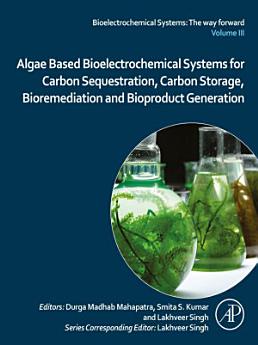Algae Based Bioelectrochemical Systems for Carbon Sequestration, Carbon Storage, Bioremediation and Bioproduct Generation
About this ebook
About the author
Durga Madhab Mahapatra is an Assistant Professor (Selection Grade) at the Department of Chemical Engineering, Energy Cluster, School of Advanced Engineering, University of Petroleum and Energy Studies (UPES), Dehradun, India. Before joining UPES, he was with the Department of Biological and Ecological Engineering (BEE), School of Engineering (SoE), Oregon State University (OSU), Corvallis, OR, USA from 2016 onwards as a Postdoctoral Fellow, Teaching staff, and Affiliate. He completed his Doctoral studies in Bioprocess Engineering, from the Indian Institute of Science (IISc), Bangalore in 2015 from the Faculty of Engineering with a Gold Medal. His major areas of interest are Sustainable Bioprocess Development, Bioenergy and Bioresources, Wastewater Metagenomics, Wastewater Treatment and Waste Biorefinery, and Nano-biotechnological Applications in Agricultural, and Environmental Research.
Lakhveer Singh is an Associate Professor at the Department of Chemistry, Sardar Patel University, Mandi, Himachal Pradesh-175001, India. Earlier, he worked as an Associate Professor at SRM University-AP and University Malaysia Pahang, Malaysia and as post-doctoral researcher at Oregon State University, Corvallis, USA. His major areas of research expertise are Energy Production, Bioelectrochemical Systems, Wastewater Treatment, and Nanomaterial Synthesis for Sustainable Applications. He is enlisted in the world top 2% scientists list released in 2021 by Stanford University in the field of energy and environment.
Smita Kumar is faculty in the Department of Environmental Studies, Central University of Haryana, Mahendragarh, Haryana, India. She is skilled in environmental issues, particularly water and wastewater treatment and bioenergy generation. Her Ph.D. focused on bioelectrochemical stabilization of landfill leachate using Microbial Fuel Cell Technology. She did her post-doctoral research from Centre for Rural Development and Technology, Indian Institute of Technology Delhi. Her research interests include Water and Wastewater Treatment; Environmental Pollution Assessment and Abatement; Environmental Biotechnology; Bio-energy Production; Landfill Leachate Treatment; and Bioremediation. She is enlisted in the world’s top 2% scientists list as released in 2021 by Stanford University in the field of environment.




